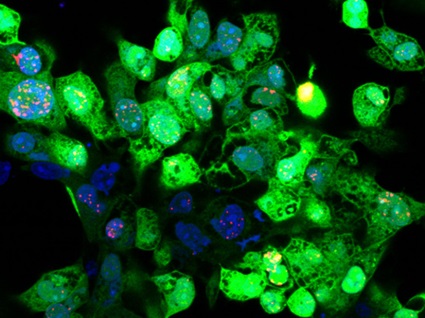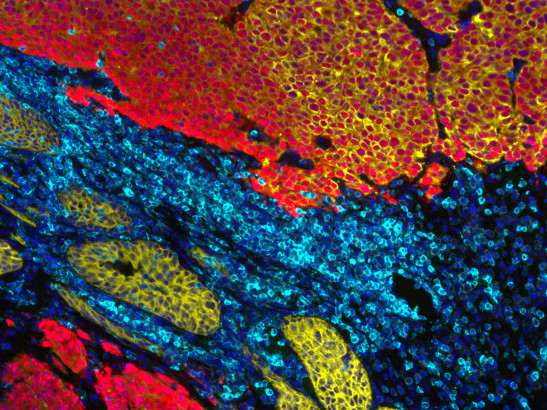Cancer discovery news
Our researchers are making the discoveries that defeat cancer. Read the latest findings from our world-leading research.
Visit our main news hub to read about news on new funding, our fundraising activities and much more. If you want to keep updated on our news, you can follow us on social media or sign up for our Search newsletter.
If you’re a journalist and want to find out more, you can contact our media relations team.

Two-in-one drug combining Herceptin with chemotherapy keeps women’s breast cancers at bay
Guiding chemotherapy to a tumour by attaching it to the antibody-based target drug Herceptin (trastuzumab) is effective at treating women with breast cancer who have no other treatment options, a new clinical trial shows.

Cancer-killing virus boosts immunotherapy in hard-to-treat cancer
Combining a cancer-killing virus with immunotherapy could effectively treat advanced cancers that affect the limbs, a new study reveals.

ICR in top five in the world for academic influence and commercial impact
The ICR has ranked among the top higher education institutions in the world for the impact of its research academically and commercially.

ICR appoints Dr Adrian Cottrell, GSK Vice President, as Chief Information Officer
The Institute of Cancer Research, London, today announces the appointment of a leading international expert in research and development IT at GlaxoSmithKline (GSK), to lead its information and communication technologies.

Cancer's last note – Royal Philharmonic Orchestra create 'unfinished symphony' to support new cancer centre
The Institute of Cancer Research, London and the Royal Philharmonic Orchestra create an ‘unfinished symphony’ for cancer research – to raise funds to complete a revolutionary new research building

ASCO 2019: Breast cancer drug effective in 80 per cent of men with BRCA-mutant prostate cancer
A pioneering gene-targeted drug already licensed for breast and ovarian cancer can benefit some men with prostate cancer, a major new clinical trial reports.
-being-attacked-by-two-cytotoxic-t-cells-(red)-547x410.tmb-hbmobile.png?Culture=en&sfvrsn=8f59440b_2)
ASCO 2019: Immunotherapy better than aggressive chemotherapy as first treatment option for recurrent head and neck cancer
Immunotherapy used with chemotherapy or on its own is a better first-line treatment for people with head and neck cancer that has returned than standard aggressive chemotherapy, new clinical trial results show.

ASCO 2019: New blood test predicts breast cancer’s return at start of treatment
A new blood test for women with breast cancer can predict how well patients will respond to a new drug right at the start of treatment.

ASCO 2019: ICR-discovered drug shows promise in phase I clinical trial
A precision medicine targeting a key protein which helps cancer cells to tolerate DNA damage has shown promising results in two clinical trials.

Scientists discover ‘switch’ that helps breast cancer spread around the body
Researchers have identified a genetic ‘switch’ in breast cancer cells that helps them spread around the body.

Night shifts do not increase breast cancer risk, major UK analysis suggests
Working night shifts is not linked to an increased risk of breast cancer, a major prospective UK analysis has found.

When it comes to cancer, how can DNA become its own enemy?
Dr Gideon Coster is one of the newest Team Leaders at the ICR. Here we take a look at his research, aiming to understand how DNA can become its own enemy.